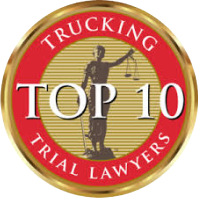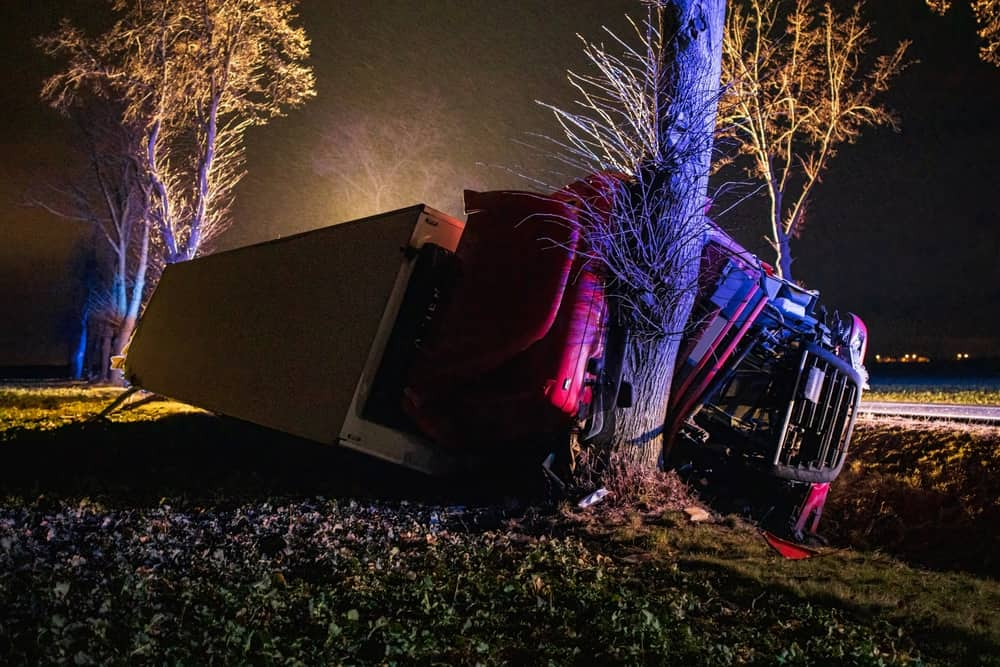Truck drivers or trucking companies can cause accidents through negligence, such as speeding, distracted driving, or failing to properly maintain the vehicle. Companies may push drivers to exceed hours-of-service limits, leading to fatigue, or they may fail to ensure that the truck is safely loaded.
You should retain an experienced truck accident lawyer as soon as possible after your accident, especially if you’ve suffered serious injuries. An attorney can investigate the accident, identify all liable parties, and handle negotiations with insurance companies to pursue the fair compensation you deserve.
When to Hire a Truck Accident Attorney
Hiring a skilled truck accident attorney can help you get the compensation and justice you deserve. Consider hiring a truck accident attorney if:
- Your Case Is Complex
- You’ve Sustained Serious Injuries
- You Face Insurance Disputes
- You Need Legal Guidance and Expertise
- You’re Experiencing Emotional Stress
How do Trucking Accidents Result from Negligence?
Commercial trucking accidents often result from the negligence of either the truck driver or the trucking company. Here are the most common types:
- Rear-End Collisions – One frequent type of trucking accident is a rear-end collision, often resulting from a truck driver’s failure to maintain a safe following distance. Large trucks require significantly more time and space to stop compared to smaller vehicles. If a driver is distracted, fatigued, or speeding, they may be unable to stop in time, leading to a rear-end collision with a vehicle in front of them.
- Jackknife Accidents – A jackknife accident occurs when the truck’s trailer swings out to the side, forming a 90-degree angle with the cab. This type of accident is often due to the driver losing control, especially during abrupt braking or while navigating sharp turns. Jackknifing can be the result of inexperience, poor vehicle maintenance, or even hazardous road conditions.
- Rollover Accidents – Rollovers are another dangerous type of trucking accident. They happen when a truck tips over onto its side or roof, often due to taking a turn too quickly or improper loading of cargo. Negligence on the part of the driver – like speeding or not accounting for the truck’s high center of gravity – can lead to a rollover. The trucking company may also be at fault if they failed to ensure the truck was properly loaded and secured.
- Blind Spot Accidents – Trucks have large blind spots, or “no-zones,” where smaller vehicles are not visible to the driver. If a truck driver fails to check these blind spots before changing lanes or turning, they may sideswipe another vehicle or force it off the road. Negligence occurs when drivers don’t properly monitor their blind spots or if the trucking company doesn’t provide adequate training on this issue.
- Underride Accidents – An underride accident occurs when a smaller vehicle slides underneath the rear or side of a truck, often leading to catastrophic injuries or fatalities. These accidents can happen when a truck stops suddenly or if a driver fails to properly signal before a turn. Trucking companies can be negligent if they don’t equip their trucks with proper underride guards, which are designed to prevent such incidents.
How Do You Successfully Prove a Truck Accident Case?
To successfully prove the legal elements of a truck accident claim or lawsuit, you need to establish four key components: duty, breach of duty, causation, and damages.
- Duty – The first step is to prove that the truck driver or trucking company owed a duty of care to you or your loved one. This is generally straightforward, as all drivers, including truck drivers, have a legal obligation to operate their vehicles safely. Trucking companies also have a duty to ensure their vehicles are well-maintained, their drivers are properly trained, and that safety regulations are followed.
- Breach of Duty – Next, you must show that the truck driver or trucking company breached that duty. A breach occurs when the driver or company fails to act as a reasonable person or company would under similar circumstances. For example, if a truck driver was speeding, distracted, or driving under the influence, that fact would likely be considered a breach of duty. Similarly, a trucking company may breach its duty by failing to conduct regular maintenance on its fleet, by not screening drivers for a history of reckless driving, or by encouraging drivers to meet unrealistic delivery schedules that lead to fatigue.
- Damages – The final element is proving damages, which refers to the losses you suffered as a result of the truck accident. These can include medical bills, lost income, property damage, and pain and suffering. To prove damages, you’ll need to provide medical records, receipts, pay stubs, and any other documentation that shows how the accident affected your life physically, emotionally, and financially.
- Causation – Once a breach of duty is established, you must prove causation—meaning that the breach directly caused the accident and your injuries. It’s not enough to show that the truck driver or company was negligent; you must also demonstrate that this negligence directly led to the accident. For instance, if a truck driver was texting and ran a red light, causing a collision, you would need to link that specific act of negligence to the crash and the injuries you sustained. This often involves gathering evidence like eyewitness testimony, accident reconstruction reports, and video footage from traffic cameras.
Successfully proving these elements is essential to winning a truck accident claim or lawsuit and securing the full compensation you deserve. An experienced truck accident attorney can guide you through this complex process.
Compensation Available for Truck Accident Injuries
When you suffer injuries in a truck accident, you may be entitled to compensation to cover the losses and hardships you’ve endured. This compensation generally falls into two categories: economic and non-economic damages.
Economic Damages
Economic damages refer to the tangible, quantifiable losses resulting from the accident. These damages are typically easier to calculate because they involve specific monetary amounts.
- Medical Expenses – One of the most significant economic damages is medical expenses. This covers everything from emergency room visits, surgeries, and hospital stays to ongoing medical care, such as physical therapy and prescription medications. If your injuries require future medical treatment, you may also be compensated for those anticipated costs.
- Lost earnings – If your injuries force you to miss work time, you can recover lost income as part of your economic damages. This compensation not only covers the income you’ve already lost but also accounts for future lost earnings if your injuries prevent you from returning to work in the same capacity.
- Property Damage – If your vehicle or other personal property was damaged in the accident, you can be compensated for the repair or replacement costs. This includes not just the cost of fixing your vehicle but also any other property that was damaged, like a laptop or smartphone.
- Out-of-Pocket Expenses – This includes any other costs you incur due to the trucking accident, such as transportation to medical appointments, home care, or assistive devices like crutches or wheelchairs.
Non-economic Damages
Non-economic damages are more subjective and cover the intangible effects of the accident. These damages compensate you for the ways the accident has affected your quality of life.
- Pain and Suffering – This compensation accounts for the physical pain and discomfort you’ve experienced as a result of the accident. It also includes any chronic pain or long-term physical limitations due to your injuries.
- Emotional Distress – Truck accidents can be traumatic, and you may suffer from anxiety, depression, or post-traumatic stress disorder (PTSD). Emotional distress damages compensate you for the mental and emotional toll of the accident.
- Loss of Consortium – If your injuries negatively affect your relationship with your spouse, you may be entitled to compensation for loss of consortium. This covers the loss of companionship, affection, and sexual relations.
This compensation is essential for helping you recover and rebuild your life after a truck accident. An experienced trucking accident lawyer can assess the full scope of your damages and pursue the compensation you deserve.
What Makes a Good Truck Accident Lawyer?
When you’re involved in a truck accident, choosing the right attorney can significantly affect the outcome of your case. Here are some qualities that define a good truck accident attorney:
- Legal Experience and Knowledge – A good truck accident attorney should have substantial experience in handling truck accident cases specifically. Truck accidents are often more complicated than regular car accidents due to factors like federal regulations, multiple parties involved, and the severity of damages. An attorney with a deep understanding of trucking laws, industry standards, and dealing with trucking companies and their insurers is crucial. They should have a proven track record of successfully handling similar cases, which demonstrates their ability to navigate the complexities of truck accident claims.
- Strong Negotiation Skills – Insurance companies are notorious for offering lowball settlements to accident victims. A truck accident attorney needs to be a skilled negotiator who can effectively advocate for your rights. They should have the ability to stand firm against insurance companies, leveraging their knowledge and experience to push for a fair settlement that fully compensates you for your losses.
- Litigation Experience – While many cases settle out of court, some may require litigation. A good truck accident attorney should be prepared to take your case to trial if necessary. This means having strong litigation skills, including the ability to present a compelling case to a judge or jury. Their courtroom experience and confidence can make a significant difference if negotiations break down and your case goes to trial.
- Compassion and Communication – Truck accidents can have devastating consequences, leaving victims physically and emotionally scarred. A truck accident lawyer should demonstrate genuine compassion for what you’re going through. They should also be able to communicate clearly and empathetically, keeping you informed about your case’s progress and explaining complex legal concepts in a way that you can understand. Open, honest communication builds trust and ensures that you’re always aware of what’s happening with your case.
- Resources and Support – A truck accident case often requires a thorough investigation, expert testimony, and access to specialized resources. A good attorney should have the necessary resources and a network of experts—such as accident reconstruction specialists, medical professionals, and economists—who can help build a strong case.
These qualities combined ensure that your attorney can provide the guidance, support, and legal skills necessary to maximize your chances of a successful outcome in your truck accident case.
How Can a Truck Accident Lawyer Help with Your Case?
A knowledgeable truck accident lawyer can be an invaluable asset when you’re dealing with the aftermath of a truck crash. Here are some of the key ways they can help with your case:
- Investigating the Accident – One of the first things a skilled truck accident lawyer will do is conduct a thorough investigation of the accident. This involves gathering evidence from the scene, such as photographs, police reports, and witness statements. They may also obtain data from the truck’s black box, GPS, and any available video footage. By meticulously analyzing this evidence, your lawyer can establish the cause of the accident and identify all liable parties.
- Identifying All Liable Parties – Truck accidents often involve multiple parties who may be held responsible, including the truck driver, the trucking company, the truck’s manufacturer, or even a maintenance provider. A knowledgeable truck accident lawyer will examine all potential sources of liability to ensure that every party who contributed to the accident is held accountable. This is crucial for maximizing your compensation, as it ensures that all avenues for recovery are explored.
- Navigating Complex Truck Laws and Regulations – Trucking is a heavily regulated industry under both state and federal laws. These regulations can be complex and confusing for someone without legal experience. A knowledgeable truck accident lawyer will be familiar with these laws and know how to apply them to your case. They can determine whether the truck driver or trucking company violated any regulations, such as hours-of-service rules, and use that information to strengthen your claim.
- Dealing with Insurance Companies – Insurance companies often try to minimize payouts by disputing claims or offering low settlements. An experienced truck accident lawyer will know how to deal with these tactics. They can negotiate on your behalf, ensuring that you receive a fair settlement that fully compensates you for your injuries, medical expenses, lost income, and other damages. If the insurance company refuses to offer a fair amount, your lawyer can take the case to court.
- Representing You in Court – If your case goes to trial, having a lawyer who is experienced in litigation is essential. They will present a compelling case to the judge or jury, using evidence and expert testimony to establish liability and damages. Their goal is to secure the best possible outcome for you, whether through a favorable settlement or a court verdict.
With a knowledgeable truck accident lawyer by your side, you can focus on your recovery while they handle the legal complexities of your case.
Call an Experienced Truck Accident Lawyer Right Away

If you suffered injuries in a commercial trucking accident caused by a negligent truck driver or trucking company, you are not alone. A skilled truck accident attorney can guide you through each step, help you avoid common mistakes, and pursue the settlement or litigation compensation you deserve.

